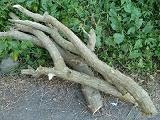Reading From the Heart by Gina Lopez column entitled "A plea for our motherland" from last week's Sunday Lifestyle of The Philippine Star, dated February 27, 2011 is an eye opener for most of us. At least for me, because I haven't been updated on the current news from the newspaper, television or from the internet upon weeks now. (click on link to read the article -- http://www.philstar.com/Article.aspx?articleId=661134&publicationSubCategoryId=86)
The issue here is that mining is the current problem which Palawan is facing today; That the Department of Energy and Natural Resources (DENR) issued an Environmental Compliance Certificate (ECC) to mine in the area of Brooke's Point, Mt. Matalingahan, Palawan, which is a key biodiversity site; The Palawan Council for Sustainable Development (PCSD) rezoned about 90% of 2,400 hectares, allowing mining in the said area.
Upon googling other key words, I also learned from the article entitled, Miners Turn to Palawan: The Last Frontier by Kabataan Ngayon (click on link at http://www.facebook.com/note.php?note_id=417874575115) states that local officials and politicians who are endorsers of mining companies greatly outnumber those who are against mining activities; That the previous administration granted Financial or Technical Assistance Agreement (FTAA) to a Canadian mining company for a large-scale mining operation in another biodiversity site, the Victoria-Anepahan range; Other areas with mining applications mentioned are Bataraza, Narra and Arbolan; That there are 354 mining applications for the whole of Palawan.
The rape, destruction and exploitation of our natural resources has been happening since time in memorial. Evidences of illegal logging have been posted in youtube in areas all over the Philippines, which I have featured in my blog from previous posts. I am not aware if the present government is taking any actions in resolving such problems, but a "10 million signature campaign to stop mining in Palawan" was launched last February 3, 2011 by the Save Palawan Movement, which is being spearheaded by ABS-CBN Foundation Managing Director Gina Lopez after the killing of Dr. Gerardo "Dr. Gerry" Ortega (environmentalist, broadcaster, civic leader) last January 2011.
The website, No To Mining In Palawan (http://www.intellithink.com.ph/wordpress/) is where you can register and be counted. This is the least we can contribute to help save Palawan from destruction. We can also download the campaign signature forms under the same link and forward your petitions to ABS-CBN Foundation, Mo. Ignacia cor. E. Lopez Drive, Brgy. South Triangle, Diliman, Quezon City through JRS free of charge.
 Trichosanthes quinquangulata
Trichosanthes quinquangulata

 Philippines.
Philippines.











